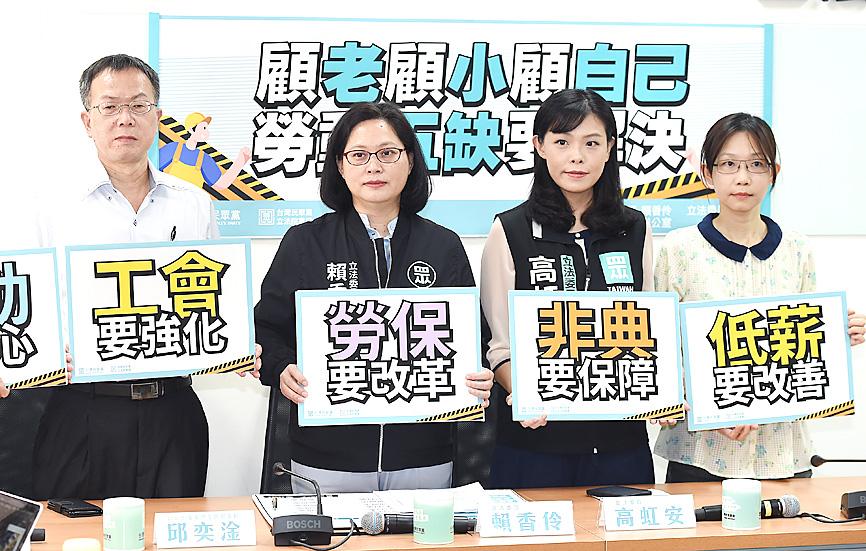Taiwan People’s Party (TPP) Legislator Lai Hsiang-ling (賴香伶) yesterday called Taiwan’s low wages “a national disgrace,” and demanded that the government improve working conditions and raise the minimum wage.
Lai was speaking at a news conference at the TPP caucus office at the Legislative Yuan in Taipei, which was also attended by representatives of the Taipei Art Creators’ Union and Taipei Confederation of Trade Unions.
Taiwan’s labor conditions fall short with regard to labor insurance, protection for atypical workers, the minimum wage, the health of labor unions and peace of mind for workers, Lai said.

Photo: Liao Chen-huei, Taipei Times
The country’s unemployment rate rose to 4 percent after the COVID-19 outbreak last year, causing much hardship, she said.
When the country’s industries complained about the so-called “five resource shortfalls” of land, water, electricity, talent and labor, the government set up a special office to address their needs, she said, adding that workers deserve the same treatment.
The government has to shore up the labor insurance fund before it becomes insolvent, which critics have said could occur in 2026, she said.
The injection of NT$22 billion (US$788.4 million) is not adequate, because the fund’s fiscal woes are worsening due to an aging tax base, she said.
The TPP caucus has proposed that workers be given 14 days of paid leave for child and elderly care per year to ease the burden on working families, which the government should support, Lai said.
The Ministry of Labor should introduce a minimum wage bill as soon as possible, as President Tsai Ing-wen (蔡英文) ran for office on a platform that supported increasing the wages of Taiwanese workers, she added.
The country’s laws do not sufficiently protect creative industry workers from overwork, intellectual property theft or exploitation, Taipei Art Creators’ Union vice president Tu Pei-shih (杜珮詩) said.
Citing a study by her union, Tu said that 48 percent of creators make less than NT$30,000 per month, less than 50 percent of them are enrolled in the labor insurance program and only 27 percent work under a formalized written contract.
TPP Legislator Kao Hung-an (高虹安) said that the party caucus has proposed amendments to the Culture and Arts Reward Act (文化藝術獎助條例), which would bolster the rights of creative industry workers and expand their participation in labor insurance.
Unreasonable regulations are to blame for Taiwan’s low unionization rate, which has remained at 7.6 percent for many years, Confederation of Taipei Trade Unions president Chiu I-kan (邱奕淦) said.
Thirty workers are needed to organize a legally recognized union in Taiwan, which is a more demanding standard than the two workers required in South Korea, seven in Hong Kong and 25 in China, he said, adding that the membership threshold should be lowered.
Other restrictions on the unionization of contract workers and a lack of collective bargaining rights have also severely hindered the growth of industrial unions, he added.
Additional reporting by CNA

Three Taiwanese airlines have prohibited passengers from packing Bluetooth earbuds and their charger cases in checked luggage. EVA Air and Uni Air said that Bluetooth earbuds and charger cases are categorized as portable electronic devices, which should be switched off if they are placed in checked luggage based on international aviation safety regulations. They must not be in standby or sleep mode. However, as charging would continue when earbuds are placed in the charger cases, which would contravene international aviation regulations, their cases must be carried as hand luggage, they said. Tigerair Taiwan said that earbud charger cases are equipped

UNILATERAL MOVES: Officials have raised concerns that Beijing could try to exert economic control over Kinmen in a key development plan next year The Civil Aviation Administration (CAA) yesterday said that China has so far failed to provide any information about a new airport expected to open next year that is less than 10km from a Taiwanese airport, raising flight safety concerns. Xiamen Xiangan International Airport is only about 3km at its closest point from the islands in Kinmen County — the scene of on-off fighting during the Cold War — and construction work can be seen and heard clearly from the Taiwan side. In a written statement sent to Reuters, the CAA said that airports close to each other need detailed advanced

Tropical Storm Fung-Wong would likely strengthen into a typhoon later today as it continues moving westward across the Pacific before heading in Taiwan’s direction next week, the Central Weather Administration (CWA) said. As of 8am, Fung-Wong was about 2,190km east-southeast of Cape Oluanpi (鵝鑾鼻), Taiwan’s southernmost point, moving westward at 25kph and possibly accelerating to 31kph, CWA data showed. The tropical storm is currently over waters east of the Philippines and still far from Taiwan, CWA forecaster Tseng Chao-cheng (曾昭誠) said, adding that it could likely strengthen into a typhoon later in the day. It is forecast to reach the South China Sea

WEATHER Typhoon forming: CWA A tropical depression is expected to form into a typhoon as early as today, the Central Weather Administration (CWA) said yesterday, adding that the storm’s path remains uncertain. Before the weekend, it would move toward the Philippines, the agency said. Some time around Monday next week, it might reach a turning point, either veering north toward waters east of Taiwan or continuing westward across the Philippines, the CWA said. Meanwhile, the eye of Typhoon Kalmaegi was 1,310km south-southeast of Oluanpi (鵝鑾鼻), Taiwan’s southernmost point, as of 2am yesterday, it said. The storm is forecast to move through central